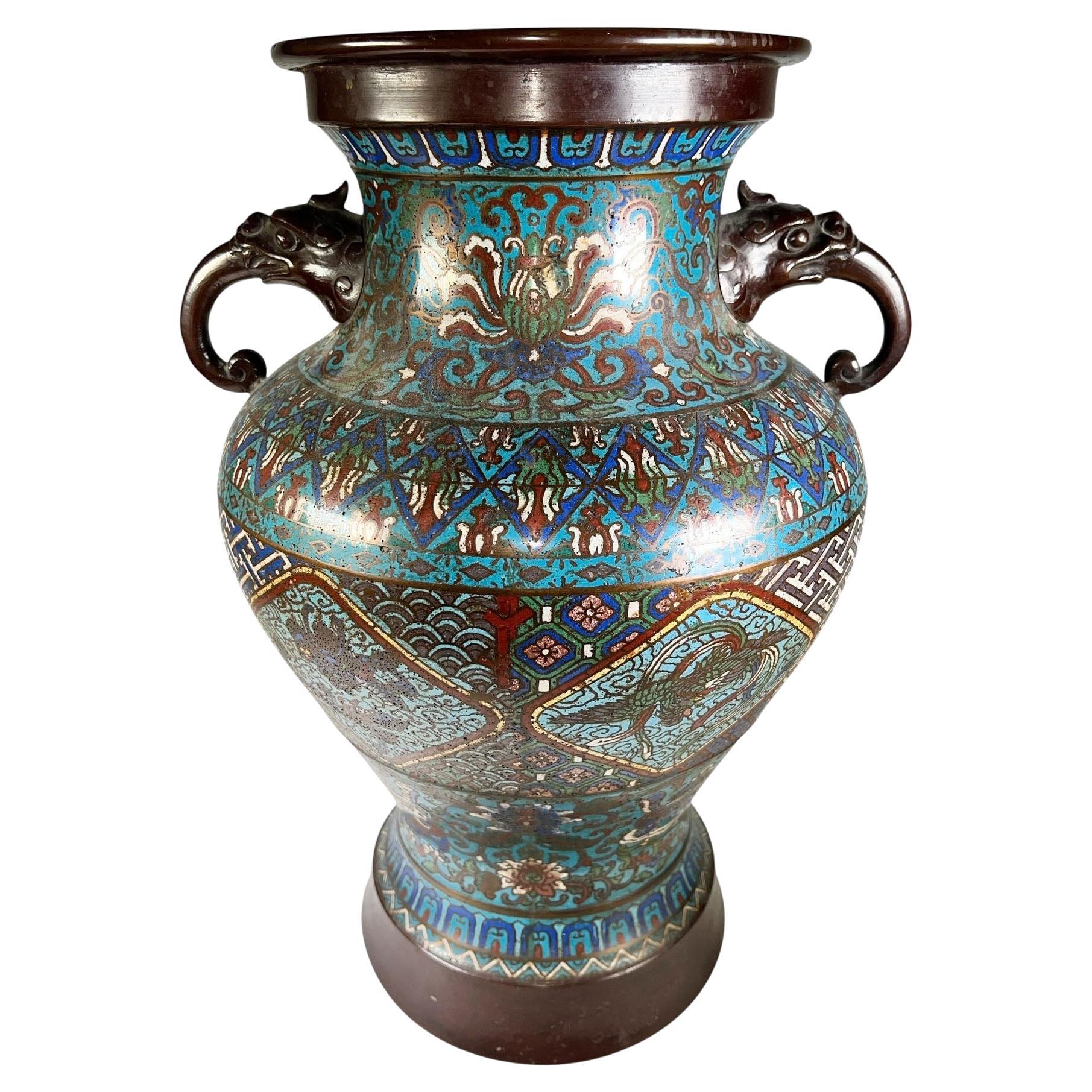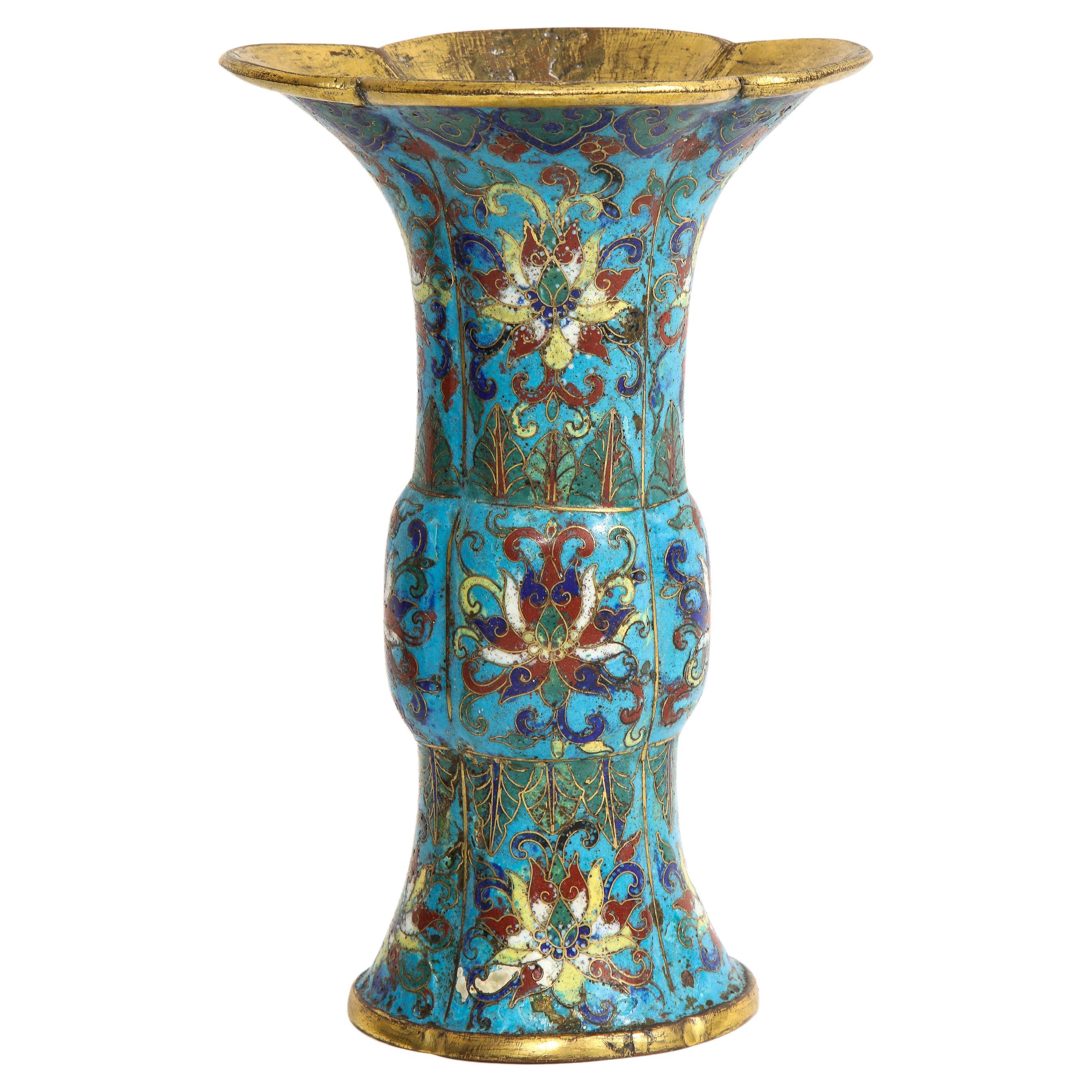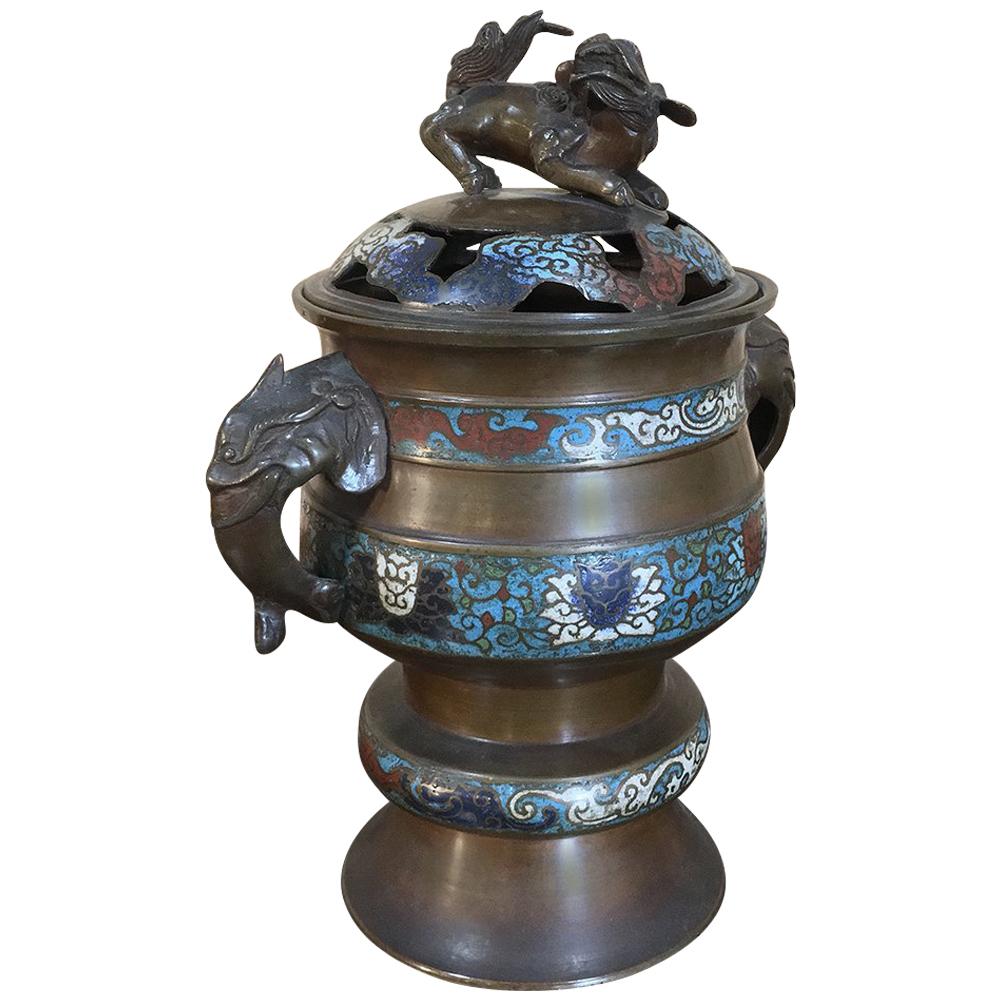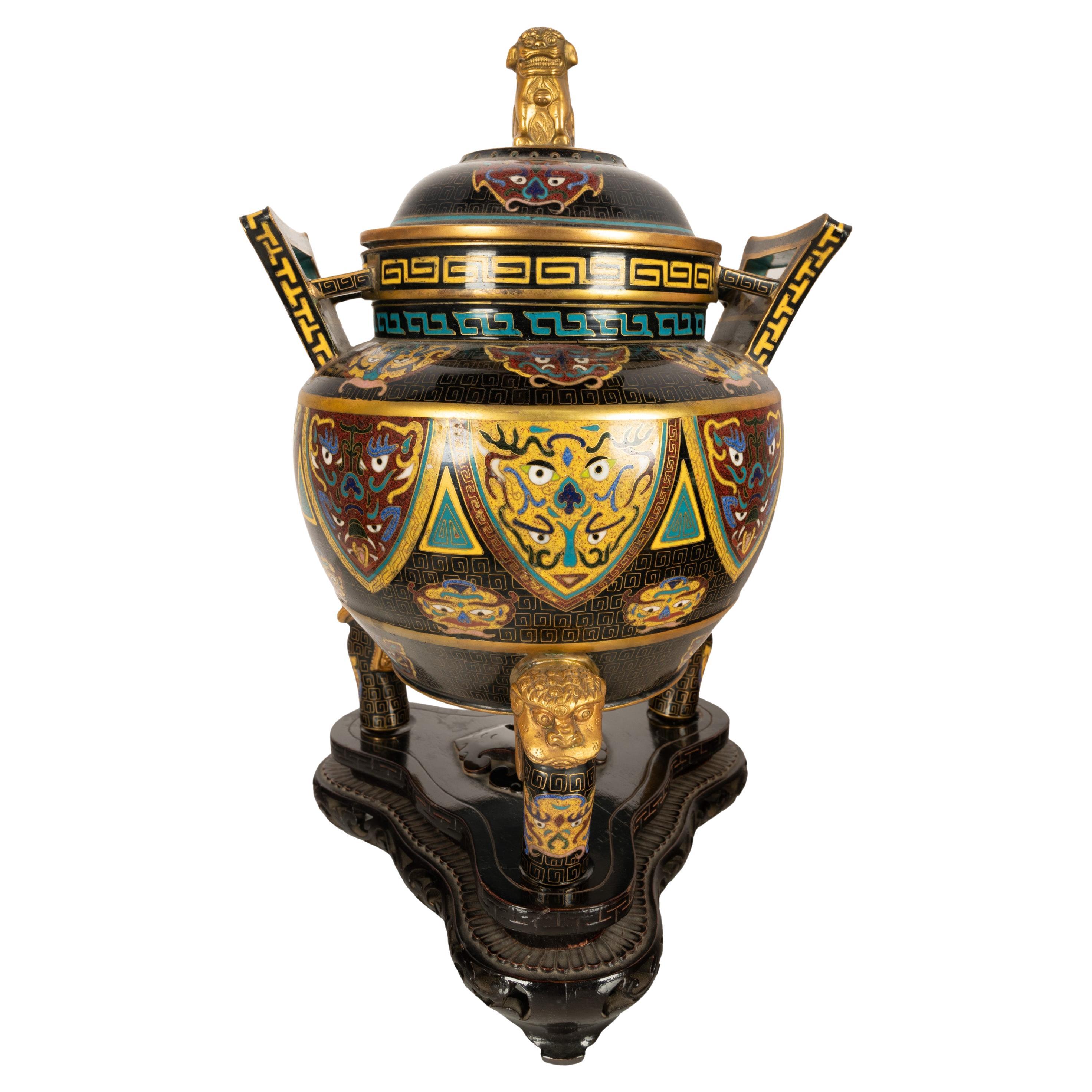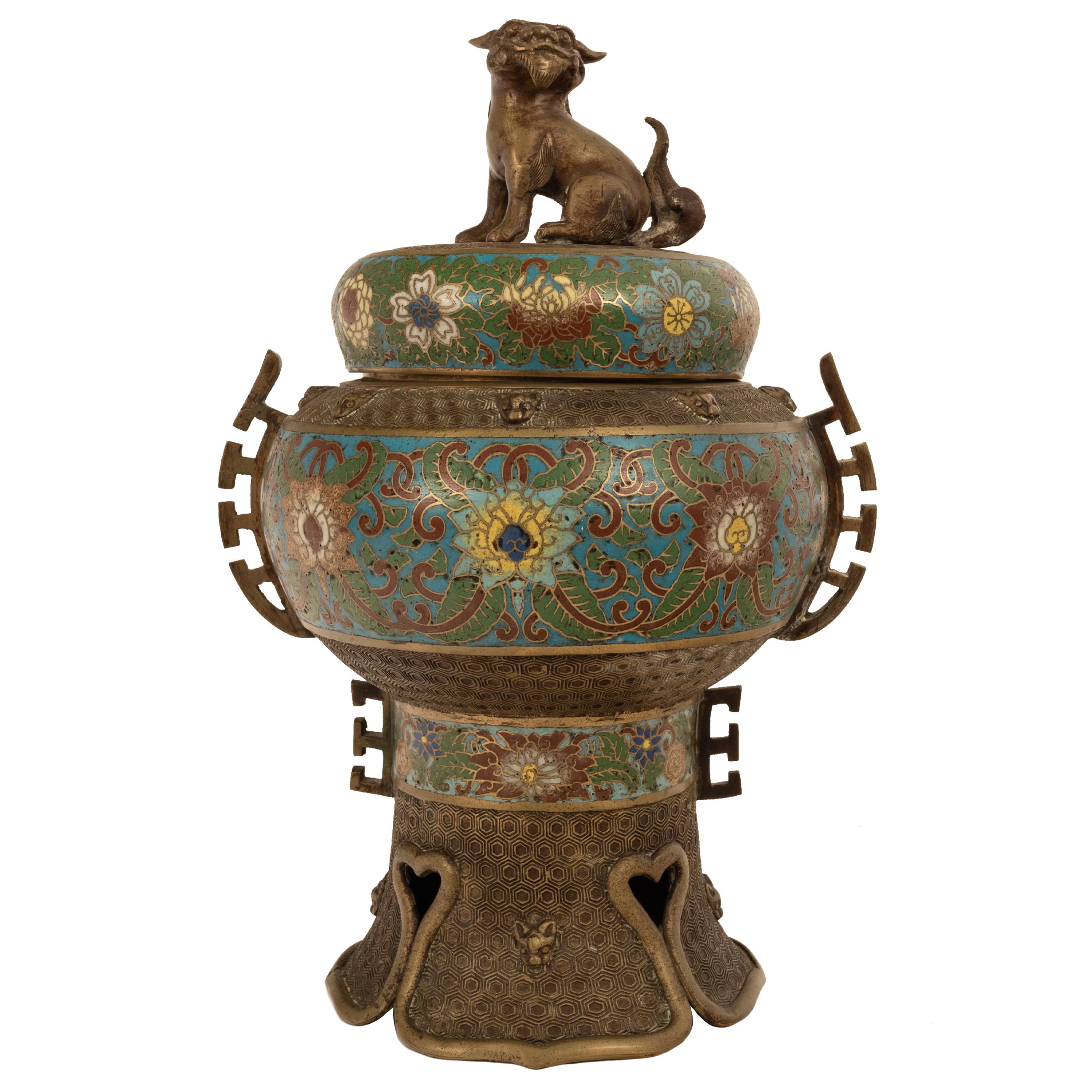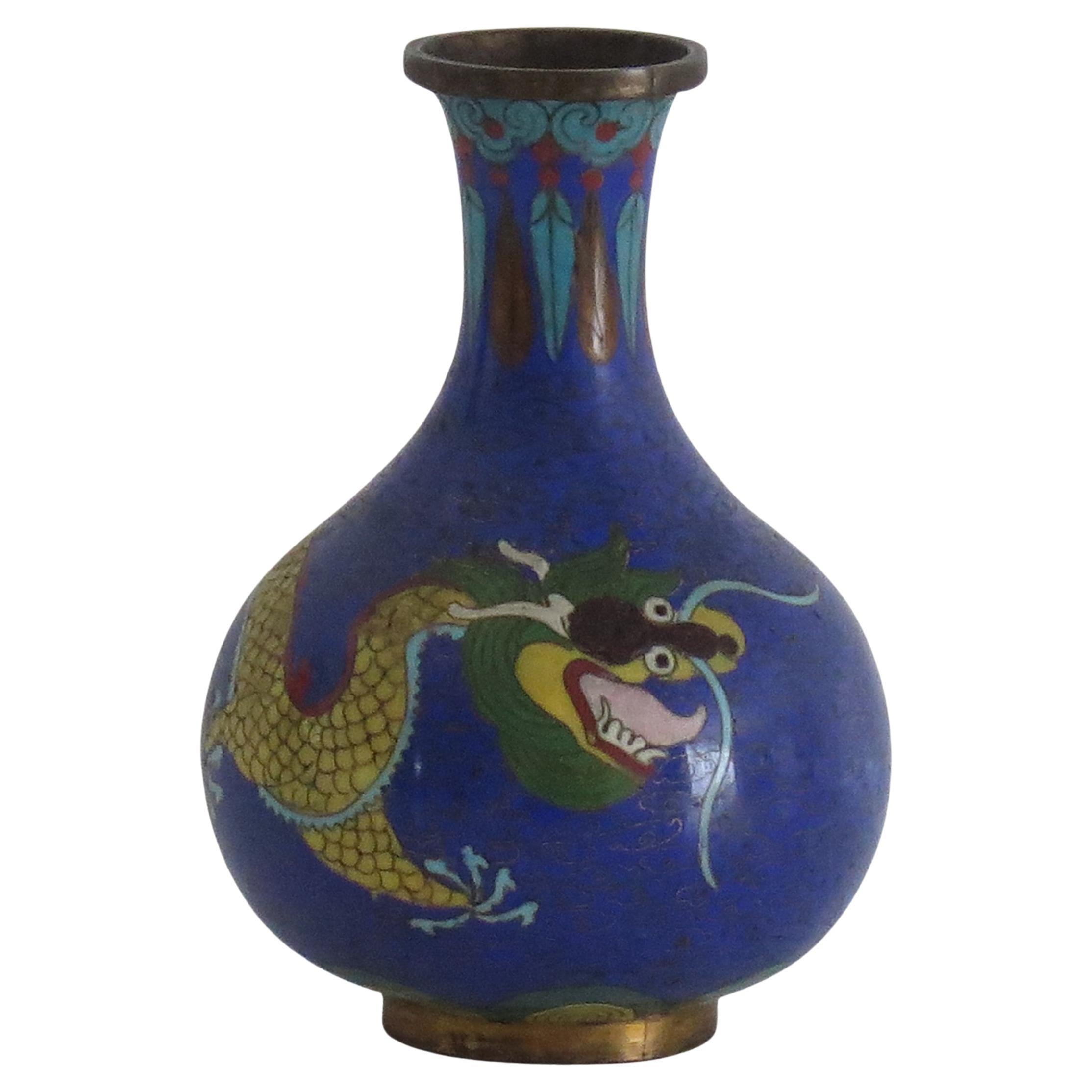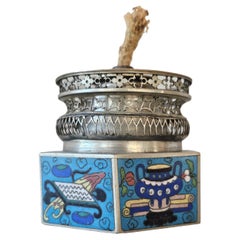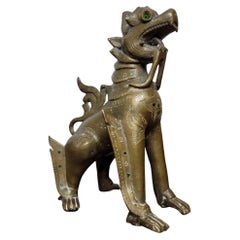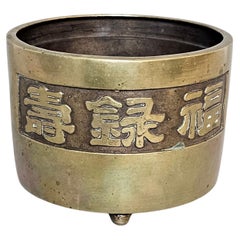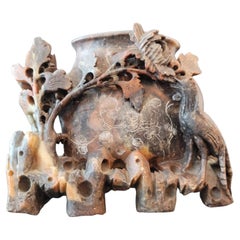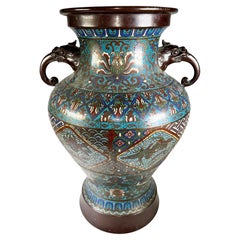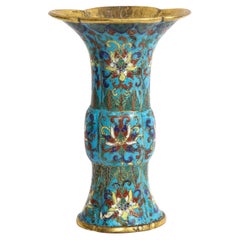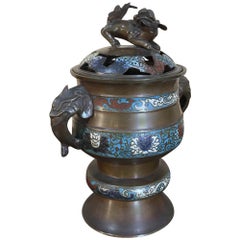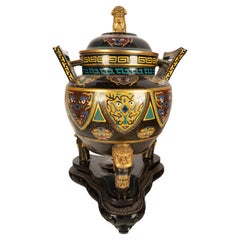Items Similar to Antique Chinese Qing Cloisonné Enamel Bronze Censer Vase in Dragon Turtle Figure
Want more images or videos?
Request additional images or videos from the seller
1 of 21
Antique Chinese Qing Cloisonné Enamel Bronze Censer Vase in Dragon Turtle Figure
$1,995
£1,500.66
€1,729.76
CA$2,810.18
A$3,083.44
CHF 1,613.73
MX$37,946.64
NOK 20,330.53
SEK 19,042.57
DKK 12,915.93
About the Item
PATINATED GILT-BRONZE AND CLOISONNÉ ENAMEL ‘BIXI AND GU’ CENSER / VASE, QING DYNASTY, CHINA, CIRCA 1850 OR EARLIER
A magnificent, very high-quality, incredibly colored 19th century Chinese cloisonné enameled censer in the figural form of a stylized dragon turtle tortoise and vase (Bixi & Gu)
Exceptionally executed throughout, finely cast in two parts, the large crouching mythical creature with its neck outstretched looking up, mouth agape to let out the incense fumes, large eyes and incised wavy sculpted mane, supporting a separately cast gu vase with four large loose ring handles on its back. The carapace richly enameled with geometric hexagonal flower motif on a turquoise blue ground enclosed by running greek-key band; The distinctively shaped gu exquisitely enameled with scrolling foliate and petal bands. Finished on all sides, the artisan spared no expense, even decorating the underside plastron. All enhanced by beautifully aged patina and highly desirable visually striking verdigris that can only be acquired over very long periods of time
DIMENSIONS: (approx)
13.375" High, 15" Wide, 8.5" Deep
PROVENANCE / ACQUISITION:
10/24: Acquired from the reputable auction house, Dallas Auction Gallery, Dallas Design District, Texas. Fall: Asian Antiques & Works Of Art catalog, lot#0004
Owned and curated by Reyne Hirsch, a long time media personality and expert in 20th century decorative arts. Hirsch was a top appraiser for Antiques Roadshow on PBS for 13 years. She's also a leading contributer to the Huffington Post, New York Times, Wall Street Journal, Architectural Digest, amongst other publications. Hirsch has also founded highly regarded permanent art galleries as well as important exhibits throughout the United States.
REFERENCE / LITERATURE:
A related cloisonné turtle, 13.1 cm long, dated to the first half of the 18th century, illustrated by H. Brinker and A. Lutz in Chinese Cloisonné: The Pierre Uldry Collection, The Asia Society Galleries, USA, 1989, pls. 259.
HISTORY / RELEVANT INFORMATION:
The bixi is a figure from Chinese mythology and has the shell of a tortoise and the body of a dragon. Stone sculptures of bixi have been used in Chinese culture for over a millennium as a decorative plinth for commemorative steles. According to the 1957 survey by Chêng Tê-k'un, the earliest extant tortoise-borne stele is thought to be the one at the tomb of Fan Min. The word bixi is translated by Chinese dictionaries as "strong," "capable to support great weight," hence its use as a base support as it is for the gu in the present lot.
*ADDITIONAL PHOTOS AVAILABLE UPON REQUEST*
CONDITION:
A remarkable example, museum quality, in overall great antique condition. Presents superbly, attractive appearance, heavily patinated, with significant sought-after verdigris. Minor scattered patination oxidation, tarnish, worn finish and accretions. Remnants of old incense to body vessel. Expected wear commensurate with age, use, handling and exposure.
Overall an outstanding work of functional art! It makes for a stunning sculpture, statue, joss burner and floral bouquet vase, sure to add a touch of whimsical elegance, sophistication, and rich cultural interest to any space!
- Dimensions:Height: 13.375 in (33.98 cm)Width: 15 in (38.1 cm)Depth: 8.5 in (21.59 cm)
- Style:Qing (Of the Period)
- Materials and Techniques:
- Place of Origin:
- Period:
- Date of Manufacture:circa 1850 or earlier
- Condition:Wear consistent with age and use. Overall wonderful, in great antique condition, attractive appearance, heavily patinated with desirable verdigris. Minor scattered patination oxidation, tarnish, worn finish, accretions, expected wear commensurate with age, use, handling, exposure.
- Seller Location:Forney, TX
- Reference Number:1stDibs: LU5977242746642
About the Seller
4.8
Platinum Seller
Premium sellers with a 4.7+ rating and 24-hour response times
Established in 2013
1stDibs seller since 2021
296 sales on 1stDibs
Typical response time: <1 hour
- ShippingRetrieving quote...Shipping from: Forney, TX
- Return Policy
Authenticity Guarantee
In the unlikely event there’s an issue with an item’s authenticity, contact us within 1 year for a full refund. DetailsMoney-Back Guarantee
If your item is not as described, is damaged in transit, or does not arrive, contact us within 7 days for a full refund. Details24-Hour Cancellation
You have a 24-hour grace period in which to reconsider your purchase, with no questions asked.Vetted Professional Sellers
Our world-class sellers must adhere to strict standards for service and quality, maintaining the integrity of our listings.Price-Match Guarantee
If you find that a seller listed the same item for a lower price elsewhere, we’ll match it.Trusted Global Delivery
Our best-in-class carrier network provides specialized shipping options worldwide, including custom delivery.More From This Seller
View AllAntique Chinese Cloisonne Enamel Opium Oil Lamp
Located in Forney, TX
A rare and a bit unusual Qing Dynasty (1636-1912) cloisonne enameled opium lamp. Originating in China in the 19th century, the silver-tone oil lamp features a six sided base with uni...
Category
Antique 19th Century Chinese Qing Metalwork
Materials
Metal, Enamel
19th Century Burmese Jewel Inlaid Bronze Temple Guardian
Located in Forney, TX
A scarce, high-quality antique Burmese jewel inlaid solid bronze chinthe sculpture.
Dating to the late 19th century, likely originating in the Mandalay region of central Burma, the fearsome looking beast depicted in traditional Burmese iconography and important architecture, especially as a pair, the protective temple guardians placed flanking the entrances of Buddhist religious pagodas and monasteries.
Burma; circa 1880
PROVENANCE:
The estate of Mr. Wesley and Mrs. Suzanne LaFever, Beverly Hills, California.
ACQUISITION:
We acquired this outstanding example from the reputable auction house, Austin Auction Gallery, Austin, Texas. Fine Estates and Antiques catalog, December 2021
DESCRIPTION:
Exquisitely sculpted and cast of heavy, patinated solid bronze, finely detailed and decorated throughout, intricately engraved with scrolling ornamentation and fine detailing work, old nicely aged polished finish developing a warm, mellow patina with highly desirable scattered verdigris, minor inlay losses add to the charming antique character.
Stoic in stance, posed at attention proudly squatting back on its haunches, front legs straight, possibly roaring with head up and straight ahead, mouth ajar with teeth and long tongue exposed, ornate armor plating and horned mane, fanciful stylized tail, inset with Myanmar style brilliant colored mirrored glass jewels.
BRIEF HISTORY / BACKGROUND:
Predating the use of coins for money, brass weights cast in the shape of iconic animals like the Chinthe were commonly used to measure standard quantities of staple items.
Chinthe, the Burmese word for lion, while leograph of Chinthe is an artistic highly stylized lion; the rare Southeast Asian Burmese equivalent to Foo Dogs, Japanese Komainu, Tibetan Snow Lion...
Category
Antique Late 19th Century Asian Sculptures and Carvings
Materials
Bronze
Antique Chinese Qing Bronze Censer Incense Burner Cachepot
Located in Forney, TX
A high quality Qing Dynasty (1636-1912) Chinese bronze brazier censer (today use as an incense burner - cachepot planter - decorative table box) encircled with traditional characters, rising on three ball feet, nicely patinated. Functional and decorative, it's a superb example of antique Asian...
Category
Antique 19th Century Chinese Qing Metalwork
Materials
Bronze
Antique Chinese Carved Soapstone Spill Vase
Located in Forney, TX
An exceptionally hand-carved antique Chinese soapstone spill vase - spill holder (see below), profusely decorated and intricately detailed naturalistic sc...
Category
20th Century Sculptures and Carvings
Materials
Soapstone
Antique Chinese Glazed Ceramic Song Dynasty Style Funerary Urn
Located in Forney, TX
Antique Chinese Qingbai ware late Southern Song dynasty (960 to 1279) / Yuan dynasty (1271 to 1368) style funerary urn.
High-quality glazed ceramic garlic head vasiform vessel, dec...
Category
Antique 19th Century Chinese Ceramics
Materials
Ceramic
Antique Japanese Patinated Bronze Buddhistic Lion Censer 17th/18th Century
Located in Forney, TX
A remarkable Edo Period (1603-1868) Japanese patinated bronze Buddhistic lion censer, exceptionally executed sculptural shishi foo dog form, finely detailed, retaining the original r...
Category
Antique 18th Century Japanese Edo Metalwork
Materials
Bronze
You May Also Like
Chinese Cloisonné Bronze Urn with Beast Handles
Located in Dallas, TX
A striking 19th century Chinese cloisonné urn, circa 1870, featuring richly enameled surfaces and bold bronze beast form handles. The body is beautifully decorated in traditional clo...
Category
Antique 1870s Chinese Urns
Materials
Metal, Bronze
Antique Chinese Cloisonné Enamel Gu Form Vase, 17th/18th Century, Kangxi Period
Located in New York, NY
A Fantastic, rare, and antique Chinese Cloisonné Enamel Gu Form vase, 17th/18th century, Kangxi Period. This cloisonne vase is extremely rare to find in this quality, condition, age,...
Category
Antique Late 17th Century Chinese Qing Metalwork
Materials
Bronze
19th Century Asian Cloisonné Incense Burner
Located in Dallas, TX
This 19th Century Asian Cloisonne Incense Burner is a wonderful decorative accent from a bygone era ~ that still works! The process to create...
Category
Antique Late 19th Century Chinese Chinoiserie Urns
Materials
Bronze, Enamel
Antique Chinese Qing Dynasty Cloisonne Censer Ding Lidded Incense Burner 1870
Located in Portland, OR
A fine antique 19th century Chinese cloisonne ding shaped lidded censer/incense burner on stand, circa 1870. The twin handled censer having a gilded foo dog finial to the lid, the li...
Category
Antique 1870s Chinese Qing Metalwork
Materials
Copper, Enamel
Antique Chinese Qing Dynasty Bronze Cloisonne Enamel Censer Insence Burner 1900
Located in Portland, OR
A good, large, antique Chinese Qing dynasty bronze and cloisonne censer, circa 1900.
The lidded censer having a Chinese lion (Shi) to the lid, the...
Category
Antique Early 1900s Chinese Qing Metalwork
Materials
Bronze, Enamel
$1,000 Sale Price
20% Off
19th Century Chinese Cloisonné Vase with Dragon chasing pearl, Qing Period
Located in Lincoln, Lincolnshire
This is a very decorative small cloisonné vase, made in China and dating to the second half of the 19th Century, Qing period.
The vase has a g...
Category
Antique 19th Century Chinese Qing Ceramics
Materials
Ceramic
More Ways To Browse
Antique Turtle
Greek Bronze Figure
Chinese Cloisonne Enameled
Large Turtle
Bronze Polychrome
Gold Enamel Dragon
Greek Key China
Large Greek Statue
Large Antique Bronze Statue
Large Cloisonne Chinese
Old Antique Fans
Bronze Dragons
Greek Key Vases
20th Century Chinese Cloisonne Enamel Vases
China Vases Cloisonne Enamel
Antique Bronze Dragon
Bronze Cloisonne Vase
Antique Chinese Cloisonne Vases
